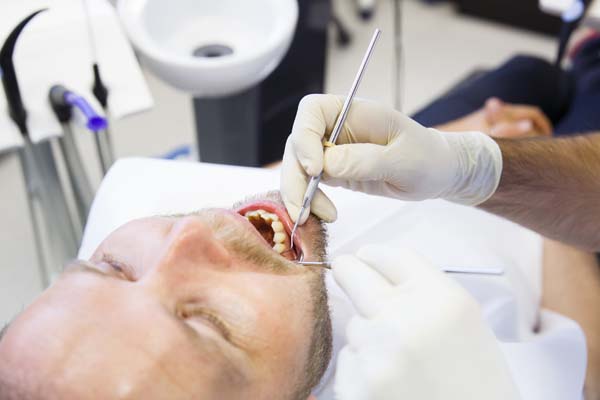A General Dentist Answers FAQs About Fluoride Treatments

Fluoride treatments are a method of cleaning teeth that your general dentist can provide. It is a naturally occurring mineral found in water and food that can go a long way toward protecting your teeth. It is vital to keep the tooth enamel healthy and fight off bacteria that can harm your teeth and gums and has been an essential oral health treatment for decades.
Fluoride is beneficial if you are at a high risk of developing cavities. Cavities, also known as dental caries, are caused by acid-producing bacteria that accumulate around the teeth and gums in the form of a sticky, clear film known as plaque. Plaque is more likely to develop if you have poor oral hygiene and do not visit the dentist often enough. If the plaque breaks down the tooth enamel, bacteria can infect the nerves and blood that make up the pulp, or core, of the tooth.
Let's take a closer look at some of the most commonly asked questions about this treatment and how it impacts oral health.
Can adults benefit from fluoride?
Yes. Experts believed that the primary function of fluoride was to strengthen the teeth while they are in the developing stages – thus making its use most effective in children – but new research has found that people of all ages can benefit from the use of fluoride. Topical fluoride is found in mouthwash, toothpaste, and fluoride treatments. In short, adults should also get these treatments to help protect their teeth.
What happens during a professional fluoride treatment?
You may be surprised at just how simple it is to get treatment at your dentist's office. A general dentist can provide fluoride treatments in a rinse, foam, gel, or varnish that is highly concentrated. The treatment is applied using a swab, tray, mouthwash, or brush. Professional fluoride treatments contain much more fluoride than what is found in water or over-the-counter toothpaste and mouthwash. Fluoride treatments only take a few minutes to apply. Your general dentist may recommend that you wait to eat or drink anything until at least half an hour after the fluoride treatment so the fluoride can be fully absorbed. It is also essential to discuss your full medical and dental history with your dentist so that they can give you the right type of fluoride treatment.
What conditions can fluoride help treat?
Flouride can certainly help treat and present a variety of dental issues. People with certain conditions or dental appliances may be especially vulnerable to tooth decay. If you have a dry mouth or xerostomia, you are more likely to have tooth decay due to insufficient saliva. Saliva is essential in washing away food particles and neutralizing acids.
Suppose you have a history of frequent cavities (i.e., you get a new cavity or multiple cavities each year or every other year). In that case, fluoride application will help treat existing cavities and prevent new cavities from forming.
If you have dental crowns, bridges, or braces, you are more susceptible to tooth decay, especially in areas where your crown meets the underlying tooth structure or around the brackets of your braces.
If you have gum disease, your tooth roots are exposed to bacteria, increasing your risk of tooth decay. Fluoride application treatments reduce the risk of tooth decay.
A simple treatment can help prevent the mentioned conditions and keep your teeth healthy and strong for longer.
Is fluoride toothpaste enough?
The short answer is no, fluoride toothpaste is simply not enough when it comes to protecting your teeth. Experts agree that additional fluoride treatments are beneficial in ensuring that the teeth are properly protected. However, you should seek out toothpaste that has this mineral in it.
Why do people still get cavities even if they use fluoride treatments?
While fluoride is effective, fluoride alone won't prevent all cavities from forming. Even with treatments, it's still important to follow good oral hygiene habits such as brushing, flossing, and using mouth wash. All of these things together are what help prevent cavities.
Fluoride treatments at the dentist
Fluoride is naturally found in water and food. Still, it can also be added to toothpaste and mouthwash or applied by a general dentist in a concentrated rinse, foam, gel, or varnish applied with a swab, tray, mouthwash, or brush. Speak with your dentist to learn more about your options and how fluoride can b used to protect your smile.
Request an appointment here: https://www.korsmofamilydental.com or call Korsmo Family Dental at 2533360016 for an appointment in our Tacoma office.
Check out what others are saying about our services on Yelp: Read our Yelp reviews.
Recent Posts
When it comes to health and wellness, prevention plays an integral role. In addition to making healthy lifestyle choices, practicing routine dental care is a vital step in maintaining a healthy mouth and body. There are numerous benefits for patients who commit to proper home and professional dental care.Routine dental care is necessary to maintain…
Professional teeth cleaning is an important aspect of routine dental care. In addition to practicing thorough oral hygiene habits that include regular brushing and flossing of the teeth, patients should always maintain biannual dental exams to ensure excellent oral health.The following are a few of the numerous benefits that regular teeth cleanings offer when included…
Daily oral hygiene habits should not be considered a substitute for the routine dental care that occurs during a dental checkup and cleaning. There are oral health concerns that a dentist will be able to proactively address during an office visit, but the equipment and tools used to care for both teeth and gums are…
When patients go for routine dental care, they may or may not have X-rays taken of their mouths. Dentists use these important diagnostic tools to check all layers of the tooth. While a key part of routine care, X-ray imaging may not be taken every visit. Every patient is different, and the recommended frequency for…


